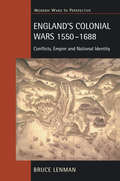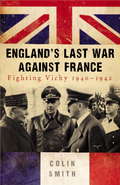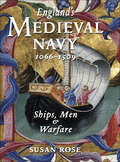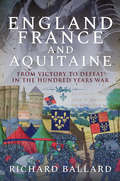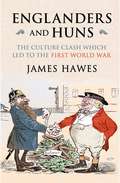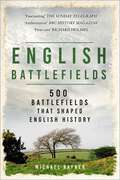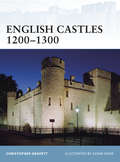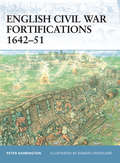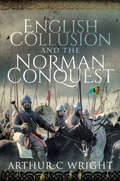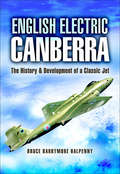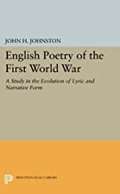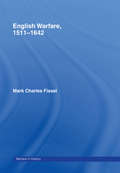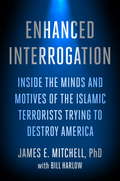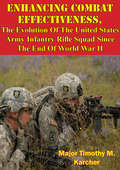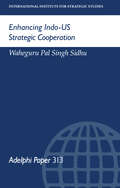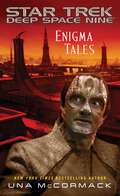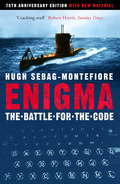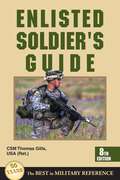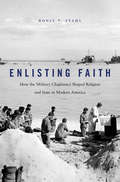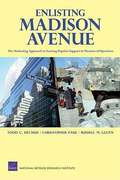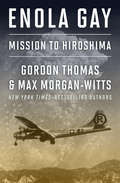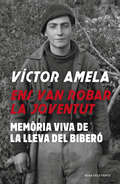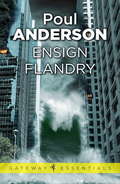- Table View
- List View
England's Colonial Wars 1550-1688: Conflicts, Empire and National Identity (Modern Wars In Perspective)
by Bruce LenmanBruce Lenman's hugely ambitious study explores three interacting themes: the growth of England's sprawling colonial empire; its military dimension; and the impact of colonial warfare on national identity. He starts in Ireland, with the renewed assault of English settlers on the Irish Gaeltacht. Under the (Scottish) Stuarts, England then began a dramatic expansion across the North Atlantic. In America, the 'Indian Wars', fought with minimal Crown support, helped forge an independent military capability among the colonists; while, in the West Indies, slave numbers and French intervention forced English settlers into a new dependency on the Crown. In India, the East India Company achieved ascendancy by sepoy armies under British control. These were very different kinds of empire; and a showdown became inevitable. The climactic conflict, the American Revolution, would not only dictate the future shape of colonial expansion, but also decisively reshaped the identities of all the participants.
England's Last War Against France: Fighting Vichy 1940-42
by Colin SmithGenuinely new story of the Second World War - the full account of England's last war against France in 1940-42.Most people think that England's last war with France involved point-blank broadsides from sailing ships and breastplated Napoleonic cavalry charging red-coated British infantry. But there was a much more recent conflict than this. Under the terms of its armistice with Nazi Germany, the unoccupied part of France and its substantial colonies were ruled from the spa town of Vichy by the government of Marshal Philip Petain. Between July 1940 and November 1942, while Britain was at war with Germany, Italy and ultimately Japan, it also fought land, sea and air battles with the considerable forces at the disposal of Petain's Vichy French.When the Royal Navy sank the French Fleet at Mers El-Kebir almost 1,300 French sailors died in what was the twentieth century's most one-sided sea battle. British casualties were nil. It is a wound that has still not healed, for undoubtedly these events are better remembered in France than in Britain. An embarrassment at the time, France's maritime massacre and the bitter, hard-fought campaigns that followed rarely make more than footnotes in accounts of Allied operations against Axis forces. Until now.
England's Medieval Navy, 1066–1509: Ships, Men & Warfare
by Susan RoseWe are accustomed to think of England in terms of Shakespeare's 'precious stone set in a silver sea', safe behind its watery ramparts with its naval strength resisting all invaders. To the English of an earlier period from the 8th to the 11th centuries such a notion would have seemed ridiculous. The sea, rather than being a defensive wall, was a highway by which successive waves of invaders arrived, bringing destruction and fear in their wake.Deploying a wide range of sources, this new book looks at how English kings after the Norman Conquest learnt to use the Navy of England, a term which at this time included all vessels whether Royal or private and no matter what their ostensible purpose to increase and safety and prosperity of the kingdom. The design and building of ships and harbour facilities, the development of navigation, ship handling, and the world of the seaman are all described, while comparisons with the navies of England's closest neighbours, with particular focus on France and Scotland, are made, and notable battles including Damme, Dover, Sluys and La Rochelle included to explain the development of battle tactics and the use of arms during the period. The author shows, in this lucid and enlightening narrative, how the unspoken aim of successive monarchs was to begin to build 'the wall' of England, its naval defences, with a success which was to become so apparent in later centuries.
England, France and Aquitaine: From Victory to Defeat in the Hundred Years War
by Richard BallardThe author of The Unseen Terror “looks at the fortunes of Richard II and Charles VI of France in a fascinating account of that war” (Books Monthly).This is a narrative history of England and France during the Hundred Years War, from the triumphs of Henry V to the defeat of the English and loss of Gascony and Bordeaux—a huge blow to English prestige and economic interest. This is a military history with technical detail, linked to high politics, courtly intrigue, dynastic ambition, economic interest (wine trade and Bordeaux). The story revolves around the death of two Kings, Henry V of England, soon after his military triumphs, and Charles VI of France, in 1422. Both had historic claims to the “French fiefs.” Henry was succeeded by Richard II, and Charles was succeeded by Charles VII. The contrast could hardly have been greater between Richard, a diffident, scholarly and religious figure, in an age when kings were expected to be aggressive leaders and military commanders; and Charles—an able politician, soldier and, in modern parlance, a “hard man,” who embodied the 15th century concept of kingship. Intermittent but constant warfare continued until English defeat in 1476 and the loss of Gascony and Bordeaux, and the Peace of Picquigny brought to an end a decisive episode in the Hundred Years War, foreshadowing England’s future total withdrawal from France.“An entertaining and informative review of the conflict and the factors leading up to the loss of Gascony and Bordeaux.” —Firetrench“[Ballard] teases apart the very tangled web of alliances, treaties, and double-dealing in a very clear concise and easy to follow way.” —Army Rumour Service (ARRSE)
Englanders and Huns
by James HawesA completely fresh look at the enmity between Britain and Germany that all but destroyed Europe.Half a century before 1914, most Britons saw the Germans as poor and rather comical cousins - and most Germans looked up to the British as their natural mentors. Over the next five decades, each came to think that the other simply had to be confronted - in Europe, in Africa, in the Pacific and at last in the deadly race to cover the North Sea with dreadnoughts.But why? Why did so many Britons come to see in Germany everything that was fearful and abhorrent? Why did so many Germans come to see any German who called dobbel fohlt while playing Das Lawn Tennis as the dupe of a global conspiracy?Packed with long-forgotten stories such as the murder of Queen Victoria's cook in Bohn, the disaster to Germany's ironclads under the White Cliffs, bizarre early colonial clashes and the precise, dark moment when Anglophobia begat modern anti-Semitism, this is the fifty-year saga of the tragic, and often tragicomic, delusions and miscalculations that led to the defining cataclysm of our times - the breaking of empires and the womb of horrors, the Great War. Richly illustrated with the words and pictures that formed our ancestors' disastrous opinions, it will forever change the telling of this fateful tale.
English Battlefields: 500 Battlefields That Shaped English History
by Michael Rayner'Fascinating' - The Sunday TelegraphEngland has been fought over for centuries, by invaders and in civil wars. The sites of these desperate struggles are as varied as the reasons they were fought over, be they fields, towns or fortresses, by land, sea or air. These haunted acres are places of commemoration, memory and, above all, history. These are the places where history was made, and as such they form a crucial part of the historic environment. By 'reading' them like any other form of historical evidence, much can be learned about the events which took place there. Through stripping away later features and land use with an eye for the ground, the battlefield historian can, with the use of contemporary accounts, archaeology and military history, reconstruct the events which have shaped the present. In this ground-breaking volume, covering over 500 battlefields, Michael Rayner unravels these various strands and weaves them back together to give clear, concise accounts of the battles which shaped England.
English Castles 1200-1300
by Adam Hook Christopher GravettThe simple castles raised after the Norman conquest had been developed throughout 11th and 12th centuries, whilst the introduction of Islamic and Byzantine fortification techniques from the late 12th century led to further developments in castle architecture. These fortifications were to be well tested throughout the course of the 13th century as England was riven by the conflict, characterized by prolonged sieges, between the monarchy and powerful magnates. As well as providing the focus for warfare, castles increasingly became the centres of their communities, providing a more permanent base for the lord, his family and retainers, as well as acting as centres for justice and administration.
English Civil War Fortifications 1642-51
by Peter Harrington Donato SpedaliereThe techniques of European warfare were transformed during the 15th and 16th centuries by the use of gunpowder and by substantial progress in the effectiveness and destructive power of artillery. The series of conflicts in the 1640s, known collectively as the English Civil War, was the first in the British Isles that reflected this new reality. Sieges that aimed at isolating and reducing fortified places became the dominant instrument for prosecuting the war and protective fortifications were vital, for both the besieged as well as the besieger. This title describes how both the Parliamentarians and the Royalists made use of new fortification techniques throughout the course of this conflict.
English Collusion and the Norman Conquest
by Arthur Colin WrightA historical analysis of the warfare during the Norman Conquest of England, and a look at the truth behind the legendary victor, King William I.The reality of war, in any period, is its totality. Warfare affects everyone in a society. Here, for the first time, is a comprehensive analysis of eleventh century warfare as exposed in the record of the Norman Conquest of England. King William I experienced a lifetime of conflict on and off so many battlefields. In English Collusion and the Norman Conquest, Arthur Wright’s second book on the Norman Conquest, he argues that this monarch has received an undeserved reputation bestowed on him by clerics ignorant alike of warfare, politics, economics and of the secular world, men writing half a century after events reported to them by doubtful sources. How much of this popular legend was actually created by an avaricious Church?Was he just a lucky, brutal soldier, or was he instead a gifted English King who could meld cultures and talents? This is a tale of blood, deceit, ambition and power politics which pieces together the self-interested distortion of events, brutalizing conflict and superb strategic acumen by using and analyzing contemporary evidence the like of which is not to be found elsewhere in Europe.By 1072 King William should have been secure upon the English throne, so what went wrong? How did a Norman Duke and a few thousand mercenaries take and hold such a wealthy and populous Kingdom? Even in the “Harrowing of the North,” which probably saw the death of tens of thousands, who was really to blame and why did it happen?Praise for English Collusion and the Norman Conquest“Arthur C Wright’s fresh look at how things panned out before and after the invasion provides new and fresh evidence that should not be overlooked. Brilliant.” —Books Monthly (UK)
English Electric Canberra: The History & Development of a Classic Jet (Pen And Sword Large Format Aviation Bks)
by Bruce Barrymore Halpenny&“A useful review of the development of a classic jet bomber that saw widespread service in the Royal Air Force and was exported to many overseas air forces.&” —Aeromilitaria This amazing airplane first flew in 1949 and is still in front-line service with the RAF. It has served in a variety of roles including those of tactical bomber, photo-reconnaissance, navigational trainer, maritime strike, electronic countermeasures and target-towing. It was manufactured in the USA under license as the Martin B-57 and has been exported to Argentina, Chile, India, Peru, South Africa and other Commonwealth countries. This book looks at the development of the aircraft during the early days of jet power and especially at its Rolls-Royce Avon powerplant. Each of the many marks and variants are described and illustrated by many remarkable and rare photographs. The type&’s record of service with RAF squadrons throughout its service life is given together with descriptions of the many experimental models that were used in the development of a variety of weapons and avionic systems. &“For an aircraft that has been the subject of countless books, the author still found a remarkable wealth of previously unpublished material on Canberra operations. A classic aircraft given the proper coverage it so richly deserves.&” —Airfix Model World &“A wonderfully researched tribute to this remarkable achievement, with a plethora of excellent photographs . . . Essential reading for any aviation enthusiast.&” —Pegasus Archive
English Poetry Of The First World War
by John H. JohnstonThe author deals with the shock of World War I as it was registered in the work of Rupert Brooke, Siegfried Sassoon, Edmund Blunden, Wilfred Owen, Isaac Rosenberg, Herbert Read, and David Jones. He finds in Read and Jones the culmination of a tendency away from personal lyric response toward formal control and a positive vision.
English Warfare, 1511-1642 (Warfare and History)
by Mark Charles FissellEnglish Warfare 1511-1642 chronicles and analyses military operations from the reign of Henry VIII to the outbreak of the Civil War. The Tudor and Stuart periods laid the foundations of modern English military power. Henry VIII's expeditions, the Elizabethan contest with Catholic Europe, and the subsequent commitment of English troops to the Protestant cause by James I and Charles I, constituted a sustained military experience that shaped English armies for subsequent generations. Drawing largely from manuscript sources, English Warfare 1511-1642 includes coverage of:*the military adventures of Henry VIII in France, Scotland and Ireland*Elizabeth I's interventions on the continent after 1572, and how arms were perfected*conflict in Ireland*the production and use of artillery*the development of logistics*early Stuart military actions and the descent into civil war.English Warfare 1511-1642 demolishes the myth of an inexpert English military prior to the upheavals of the 1640s.
Enhanced Interrogation: Inside the Minds and Motives of the Islamic Terrorists Trying To Destroy America
by Bill Harlow James E. MitchellIn the dark days immediately after 9/11, the CIA turned to Dr. James Mitchell to help craft an interrogation program designed to elicit intelligence from just-captured top al-Qa'ida leaders and terror suspects. A civilian contractor who had spent years training U.S. military members to resist interrogation should they be captured, Mitchell, aware of the urgent need to prevent impending catastrophic attacks, worked with the CIA to implement "enhanced interrogation techniques"--which included waterboarding.In Enhanced Interrogation, Mitchell now offers a first-person account of the EIT program, providing a contribution to our historical understanding of one of the most controversial elements of America's ongoing war on terror. Readers will follow him inside the secretive "black sites" and cells of terrorists and terror suspects where he personally applied enhanced interrogation techniques. Mitchell personally questioned thirteen of the most senior high-value detainees in U.S. custody, including Abu Zubaydah; Abd al-Rahim al-Nashiri, the amir or "commander" of the USS Cole bombing; and Khalid Sheikh Mohammed, the mastermind behind the September 11, 2001, terror attacks--obtaining information that he maintains remains essential to winning the war against al-Qa'ida and informing our strategy to defeat ISIS and all of radical Islam.From the interrogation program's earliest moments to its darkest hours, Mitchell also lifts the curtain on its immediate effects, the controversy surrounding its methods, and its downfall. He shares his view that EIT, when applied correctly, were useful in drawing detainees to cooperate, and that, when applied incorrectly, they were counter-productive. He also chronicles what it is like to undertake a several-years-long critical mission at the request of the government only to be hounded for nearly a decade afterward by congressional investigations and Justice Department prosecutors.Gripping in its detail and deeply illuminating, Enhanced Interrogation argues that it is necessary for America to take strong measures to defend itself from its enemies and that the country is less safe now without them than it was before 9/11.From the Hardcover edition.
Enhancing Combat Effectiveness;: The Evolution Of The United States Army Infantry Rifle Squad Since The End Of World War II
by Major Timothy M. KarcherThis study analyzes the organization of the US Army infantry rifle squad since the end of World War II, focusing on the attempt to gain and then maintain the capability of fire and maneuver at the squad level. Since the end of World War II, the US Army has conducted or commissioned at least nine studies, aimed at determining the optimum organization of the infantry rifle squad. Common trends affect all recent attempts at transforming the US Army and become evident when studying the evolution of the squad, but the goal must remain developing a combat effective unit.Combat effectiveness is determined by applying the evaluative criteria of control, sustainability, flexibility, and lethality. By applying these four criteria to analyze various squad organizations, one can determine the strengths and weaknesses inherent to these organizations, thereby recommending the most combat effective rifle squad organization.The US Army's current focus on strategic deployability and emerging weapons capabilities is not a new phenomenon, but potentially could cloud the essential issue, developing a military force for optimum combat effectiveness. This study concludes by recommending the optimum squad-level organization for the "Objective Force."
Enhancing Indo-US Strategic Cooperation (Adelphi series #No.313)
by Waheguru Pal Singh SidhuArgues that a carrot-and-stick policy is likely to be more effective than a stick-only approach in curbing India's nuclear ambitions. Increased strategic cooperation between India and the US is the ideal incentive, but the author argues that such cooperation is unlikely in the immediate future.
Enigma
by Robert HarrisA gripping World War II mystery novel with a cryptographic twist, Enigma's hero is Tom Jericho, a brilliant British mathematician working as a member of the team struggling to crack the Nazi Enigma code.
Enigma Tales (Star Trek)
by Una MccormackFrom the New York Times bestselling author of The Fall: The Crimson Shadow comes a compelling and suspenseful tale of politics and power set in the universe of Star Trek: Deep Space Nine.Elim Garak has ascended to Castellan of the Cardassian Union...but despite his soaring popularity, the imminent publication of a report exposing his people's war crimes during the occupation on Bajor looks likely to set the military against him. Into this tense situation come Dr. Katherine Pulaski—visiting Cardassia Prime to accept an award on behalf of the team that solved the Andorian genetic crisis—and Dr. Peter Alden, formerly of Starfleet Intelligence. The two soon find themselves at odds with Garak and embroiled in the politics of the prestigious University of the Union, where a new head is about to be appointed. Among the front-runners is one of Cardassia’s most respected public figures: Professor Natima Lang. But the discovery of a hidden archive from the last years before the Dominion War could destroy Lang’s reputation. As Pulaski and Alden become drawn into a deadly game to exonerate Lang, their confrontation escalates with Castellan Garak—a conflicted leader treading a fine line between the bright hopes for Cardassia’s future and the dark secrets still buried in its past... ™, ®, & © 2016 CBS Studios, Inc. Star Trek and related marks are trademarks of CBS Studios, Inc. All Rights Reserved.
Enigma: The Battle For The Code
by Hugh Sebag-MontefioreThe complete story of how the German Enigma codes were broken. Perfect for fans of THE IMITATION GAME, the new film on Alan Turing's Enigma code, starring Benedict Cumberbatch.Breaking the German Enigma codes was not only about brilliant mathematicians and professors at Bletchley Park. There is another aspect of the story which it is only now possible to tell. It takes in the exploits of spies, naval officers and ordinary British seamen who risked, and in some cases lost, their lives snatching the vital Enigma codebooks from under the noses of Nazi officials and from sinking German ships and submarines. This book tells the whole Enigma story: its original invention and use by German forces and how it was the Poles who first cracked - and passed on to the British - the key to the German airforce Enigma. The more complicated German Navy Enigma appeared to them to be unbreakable.
Enigma: The Battle For The Code
by Hugh Sebag-MontefioreThe complete story of how the German Enigma codes were broken. Perfect for fans of THE IMITATION GAME, the new film on Alan Turing's Enigma code, starring Benedict Cumberbatch.Breaking the German Enigma codes was not only about brilliant mathematicians and professors at Bletchley Park. There is another aspect of the story which it is only now possible to tell. It takes in the exploits of spies, naval officers and ordinary British seamen who risked, and in some cases lost, their lives snatching the vital Enigma codebooks from under the noses of Nazi officials and from sinking German ships and submarines. This book tells the whole Enigma story: its original invention and use by German forces and how it was the Poles who first cracked - and passed on to the British - the key to the German airforce Enigma. The more complicated German Navy Enigma appeared to them to be unbreakable.
Enlisted Soldier's Guide
by Thomas GillsUpdated edition of the essential guide for enlisted soldiers in the U.S. ArmyThis military reference guide, completely revised for the current army, is targeted at young men and women who have enlisted in the U.S. Army or are thinking about doing so. The book is a must-have resource for a successful career or tour as an American soldier and covers duties and responsibilities, promotion and career opportunities, real-world issues, customs and traditions, uniforms and insignia, pay and benefits, physical fitness, and personal and family matters.
Enlisting Faith: How the Military Chaplaincy Shaped Religion and State in Modern America
by Ronit Y. StahlRonit Stahl traces the ways the U.S. military struggled with, encouraged, and regulated religious pluralism and scrambled to handle the nation’s deep religious, racial, and political complexity. Just as the state relied on religion to sanction combat missions and sanctify war deaths, so too did religious groups seek validation as American faiths.
Enlisting Madison Avenue: The Marketing Approach to Earning Popular Support in Theaters of Operation
by Christopher Paul Todd C. Helmus Russell W. GlennVirtually every action, message, and decision of a military force shapes the opinions of an indigenous population: strategic communication, treatment of civilians at vehicle checkpoints, and the accuracy or inaccuracy of aerial bombardment. Themes of U.S. goodwill mean little if its actions convey otherwise. Consequently, a unified message in both word and deed is fundamental to success. Business marketing practices provide a useful framework for improving U.S. military efforts to shape the attitudes and behaviors of local populations in a theater of operations as well as those of a broader, international audience. Enlisting Madison Avenue extracts lessons from these business practices and adapts them to U.S. military efforts, developing a unique approach to shaping that has the potential to improve military-civilian relations, the accuracy of media coverage of operations, communication of U.S. and coalition objectives, and the reputation of U.S. forces in theater and internationally. Foremost among these lessons are the concepts of branding, customer satisfaction, and segmentation of the target audience, all of which serve to maximize the impact and improve the outcome of U.S. shaping efforts.
Enola Gay: Mission to Hiroshima
by Gordon Thomas Max Morgan-WittsFrom theNew York Times–bestselling coauthors: A &“fascinating . . . unrivaled&” history of the B-29 and its fateful mission to drop the atomic bomb on Hiroshima (The New York Times Book Review). Painstakingly researched, the story behind the decision to send the Enola Gay to bomb Hiroshima is told through firsthand sources. From diplomatic moves behind the scenes to Japanese actions and the US Army Air Force&’s call to action, no detail is left untold. Touching on the early days of the Manhattan Project and the first inkling of an atomic bomb, investigative journalist Gordon Thomas and his writing partner Max Morgan-Witts, take WWII enthusiasts through the training of the crew of the Enola Gay and the challenges faced by pilot Paul Tibbets. A page-turner that offers &“minute-by-minute coverage of the critical periods&” surrounding the mission, Enola Gay finally separates myth and reality from the planning of the flight to the moment over Hiroshima when the atomic age was born (Library Journal).
Ens van robar la joventut: Memòria viva de la Lleva del biberó
by Victor AmelaEns van robar la joventut narra les històries dels «biberons» que van combatre a l'Ebre, dels adolescents que es van allistar voluntaris (tant a l'exèrcit republicà com al de Franco), dels que van sobreviure i (alguns) van continuar la seva lluita a la Guerra Mundial, dels que van ser empresonats i dels que van morir en el camp de batalla. Cap al final de la Guerra Civil, 27.000 nois nascuts l'any 1920 van ser cridats a files. Se'ls va conèixer com la Lleva del Biberó i molts d'ells ni tan sols tenien divuit anys quan van perdre la vida a la sagnant batalla de l'Ebre. Els supervivents van acabar en penals i en presons franquistes, en camps de concentració o en batallons disciplinaris, i van haver de fer després un llarg servei militar. Tots van conservar de per vida el terrible record d'aquella guerra en la qual van combatre amb espardenyes i sense cartutxeres. La sarna, els polls, la set, les caminades, la metralla. Les veus trencades dels nois moribunds al camp de batalla cridant a les seves mares. Els companys morts, enterrats a centenars a la Venta de les Camposines. Un malson repetit nit rere nit, i durant anys, en el moment de tancar els ulls. La certesa que els havien robat la joventut. Víctor Amela ha recopilat el valuós testimoni de vint-i-cinc supervivents i ha reconstruït amb una investigació minuciosa la memòria d'aquests nois que van viure uniformats dels disset als vint anys. I aquestes commovedores històries humanes constitueixen -gràcies al rigor periodístic de l'autor i a la seva passió en la narració dels fets- en l'homenatge necessari i sentit als herois anònims de la Lleva del Biberó quan tot just ara es compleix el centenari del seu naixement.
Ensign Flandry: A Flandry Book (Gateway Essentials #7)
by Poul AndersonDominic Flandry had a great future ahead of him as saviour of the civilised universe. In later years his talent for swift, decisive action would give him an intergalactic reputation. But at the age of nineteen and straight out of naval academy, he was just another raw ensign.The mighty Merseian Empire had sworn to wipe the Earth from the face of the universe. The attack had already been launched, but no one knew how or where the ravening power of the savage green skinned aliens would strike. Only Ensign Flandry had the answer, in the form of a code which he might - or might not - be able to decipher.And so the Merseians were coming after Flandry with every weapon in their terrible arsenal. And just to make things worse, Earth's own armadas were after him too - for desertion, high treason and other assorted crimes. Even for a future saviour, times were looking pretty tough.
